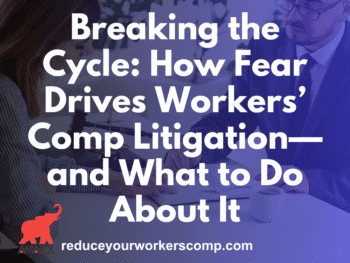The insurance company, or the third party administrator (TPA) on the behalf of the insurance company, hires the defense attorney in a workers compensation claim. While the insurance company’s attorney is hired to represent the employer in the workers compensation claim, the attorney is paid by the insurer for the services provided. Usually this works well, as normally the interest of the employer and the interest of the insurer are in sync.
However, there are situations where the employer may wish to employ a defense counsel separate from the defense counsel employed by the insurer or TPA. While the simple workers compensation claims will usually not justify the employer having separate legal counsel, there are situations in complex cases where it makes sense for the employer to have it. For example when the insurer wants to return the severely injured employee with a significant disability (from the injury) to work to lower the overall value of the claim. If the employer does so, there will be significant savings on the workers comp claim. However, the employer is then saddled with permanent modified duty arrangements to accommodate the employee returning to work. The return to work will also be complicated by the requirements (and cost) for the employer to comply with the American with Disabilities Act.[WCx]
Employees who have a gripe about an employer, employees whose claims have an element of fraud, and employees who are not interested in returning to work will often attempt to complicate the claim for their own benefit. Often the employees will make allegations against the employer such as wrongful termination, employer retaliation, or unequal treatment in an effort to exhaust the workers compensation claim. In these situations, the employer definitely needs a separate legal counsel, as the allegations are related to the workers compensation claim, but are not an actual part of the covered claim.
Whenever the plaintiff’s attorney tries to bring a Part B, Employer’s Liability claim, in an effort to circumvent the exclusive remedy of workers compensation, the employer should have a counsel separate from the insurer’s defense counsel. The employer’s counsel can monitor the claim to be sure the employer’s interests are protected.
At any time the employer is concerned that the interests of the employer are not being protected as they should be, the employer can hire a separate defense counsel with the purpose of being sure the interests of the employer are protected. The counsel selected by the employer should have extensive experience in handling complex cases and the legal acumen to understand the conflicts of interest that can arise between the employer and the insurer.
The defense attorney hired needs to be knowledgeable and able to provide the employer with guidance.
- – Claims handling
- – Board/Industrial Commission procedures
- – Handling of contested claims
- – Evaluation of complicated claims
- – Alternative dispute resolution (arbitration and mediation)
- – Medical dispute resolution
- – Fatal accidents and death benefits
- – Permanent total disability claims
- – Independent medical evaluations and provider selection
- – Retaliatory discharge and employment law
- – Americans with Disabilities Act
- – Subrogation
- – Subsequent Injury Fund
- – Appeals
If unsure about selecting the counsel, check the attorney’s Peer Review Ratings with Martindale-Hubbell. The attorneys listed in Martindale-Hubbell are rated by their peers on legal knowledge, analytical capabilities, judgment, communication ability, and legal experience in a specific area of practice. Each attorney listed by Martindale-Hubbell has been evaluated by a set of peers on a 1 to 5 scale, with 5 being the highest score. The rating of AV – Preeminent – is the highest rating given only to the attorneys with a peer rating of 4.5 to 5.0. The rating of BV – Distinguished – is given to the attorneys who receive a peer rating of 3.0 to 4.4.
Martindale-Hubbell also provides Client Review Ratings where other employers and insurers have provided feedback on an overall experience with an attorney. The Client Review Rating is based on measuring the attorney’s communication ability, quality of service, responsiveness, and value for the money.[WCx]
The employer’s counsel selected should have the attributes of integrity, passion, skill, creative solutions, resolve, aggressiveness, and thoroughness. A long-term relationship should be built with the employer’s defense counsel. By having your own counsel, you can rest assured that your interest has been protected. See also our Workers Comp Legal Library for additional info on your state.
Author Rebecca Shafer, JD, President of Amaxx Risk Solutions, Inc. is a national expert in the field of workers compensation. She is a writer, speaker, and publisher. Her expertise is working with employers to reduce workers compensation costs, and her clients include airlines, healthcare, printing/publishing, pharmaceuticals, retail, hospitality, and manufacturing. She is the author of the #1 selling book on cost containment, Workers Compensation Management Program: Reduce Costs 20% to 50%. Contact: RShafer@ReduceYourWorkersComp.com.
Editor Michael B. Stack, CPA, Director of Operations, Amaxx Risk Solutions, Inc. is an expert in employer communication systems and part of the Amaxx team helping companies reduce their workers compensation costs by 20% to 50%. He is a writer, speaker, and website publisher. www.reduceyourworkerscomp.com. Contact: mstack@reduceyourworkerscomp.com.
WORKERS COMP MANAGEMENT MANUAL: www.WCManual.com
MODIFIED DUTY CALCULATOR: www.LowerWC.com/transitional-duty-cost-calculator.php
Do not use this information without independent verification. All state laws vary. You should consult with your insurance broker or agent about workers comp issues.
©2012 Amaxx Risk Solutions, Inc. All rights reserved under International Copyright Law. If you would like permission to reprint this material, contact us at: Info@ReduceYourWorkersComp.com.



























